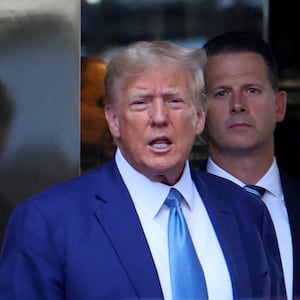Donald Trump’s lawyers gave their best indication yet Thursday of how exactly they’ll attack journalist E. Jean Carroll.
The former president’s lawyers cross-examined Carroll on Thursday, and they mirrored his claims that the accusation is merely a “scam.”
The word seems to be a conscious decision, as Trump’s lawyers repeatedly went after Carroll for an odd email to a friend where they discussed the need to stop Trump—and said they had a “scheme” in mind.
Following hours of emotional testimony where Carroll described what she called Trump’s “violent” attack at a department store nearly three decades ago, defense lawyer Joe Tacopina began to cross-examine her with questions meant to poke holes in her story.
While asking about how Carroll developed her book, which marked the first time she made that startling accusation, Trump’s lead defense attorney pointed out an exchange she had with a close friend, the fellow journalist Carol Martin.
“This has to stop,” Martin suggested in a Sept. 23, 2017 email about Trump. “As soon as we’re both well enough to scheme, we must do our patriotic duty again.”
“TOTALLY!!! I have something special for you when we meet,” Carroll responded.
Two weeks later, Carroll started a cross-country road trip to gather material for an upcoming book in 2019 about nasty men—one that ultimately included a bombshell account of Trump allegedly raping Carroll in the dressing room of Bergdorf Goodman.
Tacopina—who is known for his hostile bravado and hulking frame underneath his closely cut suits—visibly held back his aggression as he interrogated Carroll about the word “scheme.” Noting that she is a longtime author, he asked her to define the word.
On the witness stand, Carroll downplayed her friend’s use of the word “scheme” with an immediate caveat that it had no “evil… connotations.”
Carroll countered that she initially had no intention of including Trump in her book, What Do We Need Men For?: A Modest Proposal, which included a list of “the most hideous men in my life.” She testified that her decision only came five weeks after starting to write the book in October 2017. She said the pivotal realization happened when she read the groundbreaking New York Times story documenting the way Hollywood producer Harvey Weinstein abused his power to sexually assault women, which inspired her to do the same.
“The light dawned. I thought we could actually change things if we tell our story,” she said, recalling how she asked herself, “Wait a minute, can we actually speak up and not be pummeled?”
But she was pummeled—by Trump from the White House. When an excerpt of her book detailing the alleged rape ran in June 2019, Trump denied it ever happened. He has since described it as a political ploy to fabricate an event that’s meant to stop his aspirations to reassume the presidency.
Those comments led Carroll to sue him for defamation and battery, civil charges that a New York jury will consider when deciding whether Trump should pay her for damages.
The way that Weinstein was held accountable—and inspired the #MeToo movement—played a pivotal role in Carroll’s testimony. But the Trump legal team’s strategy against his accuser on Thursday also hit all of the notes that sexual assault survivors typically find deeply offensive. In the afternoon, Tacopina repeatedly asked Carroll why she didn’t do more during and after the alleged attack.
When Carroll described the way she called her journalist friend Lisa Birnbach after fleeing Bergdorf Goodman, Tacopina asked why she didn’t use her cell phone to call 9-1-1.
As his questioning progressed, he stood like a charging bull, with his left foot forward in a fighting stance and arms straight while he gripped the wooden lectern.
He noted that in the following days, Carroll never called her family, reported the matter to police, asked to pull security video from the store, checked her alleged head wound with a doctor, or sought help from a therapist or psychologist.
“I was afraid Donald Trump would retaliate,” she responded, noting that the real estate tycoon did just that when she later spoke out.
As the conversation grew heated, U.S. District Judge Lewis Kaplan increasingly intervened on Carroll’s behalf, calling out Tacopina for being argumentative and at one point halting him from asking any more questions about why Carroll didn’t reach out to the police.
The tension reached a peak when Tacopina showed the jury a network news interview Carroll did with MSNBC host Lawrence O’Donnell where the writer said she would not sue Trump because it would seem “disrespectful” compared to the experience of migrant women who’d been sexually assaulted at the U.S.-Mexico border while seeking refuge. Tacopina tried to ask why Carroll decided to sue anyway, and the judge halted him immediately.
“Move on,” he warned in a raised voice. “Move on.”
The day came to a sudden end when Tacopina brought up how Carroll never wrote down the experience in her diary—because, in her words, she didn’t want to be reminded of the horrific assault—but kept the black coat dress she wore that day. Kaplan called it quits for the day and sent the jury home for the weekend.
Editor’s Note: This story has been updated to reflect that the email Carroll sent was to Carol Martin, not Lisa Birnbach.








